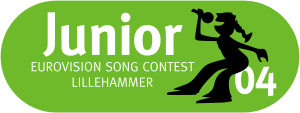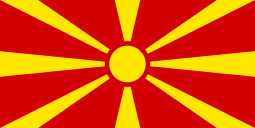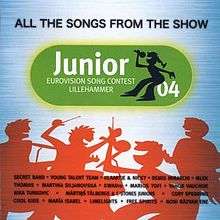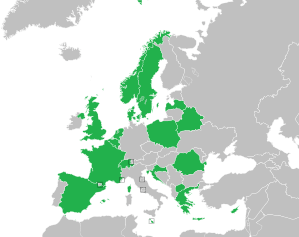Junior Eurovision Song Contest 2004
| Junior Eurovision Song Contest 2004 | ||||
|---|---|---|---|---|
 | ||||
| Dates | ||||
| Final | 20 November 2004 | |||
| Host | ||||
| Venue | Håkons Hall, Lillehammer, Norway | |||
| Presenter(s) | Stian Barsnes Simonsen Nadia Hasnaoui | |||
| Executive supervisor | Svante Stockselius | |||
| Executive producer | Ivar Ragne Jensen | |||
| Host broadcaster | Norwegian Broadcasting Corporation (NRK) | |||
| Interval act | Westlife performing "Ain't That a Kick in the Head?" | |||
| Participants | ||||
| Number of entries | 18 | |||
| Debuting countries | | |||
| Returning countries | None | |||
| Withdrawing countries | None | |||
| Participation map
| ||||
| Vote | ||||
| Voting system | Each country awards 1-8, 10, and 12 points to their 10 favourite songs | |||
| Nul points | None | |||
| Winning song | "Antes muerta que sencilla" | |||
| Junior Eurovision Song Contest | ||||
| ||||
The Junior Eurovision Song Contest 2004 was the second Eurovision Song Contest for young singers aged 8 to 15. It was held on 20 November 2004, in Håkons Hall, Lillehammer, Norway and lasted 2 hours and 15 minutes. It was presented by Stian Barsnes Simonsen and Nadia Hasnaoui, broadcast in 20 countries and viewed by 100 million people. 18 countries participated, France and Switzerland participated for the first time. Originally 20 countries had applied to take part but Germany and Israel later pulled out.[1] There were also reports that Ireland had planned to enter the programme.[2] Israel and Ireland would later debut in the contest in 2012 and 2015, respectively.
The contest was won by 9-year-old María Isabel with her song Antes muerta que sencilla (Better Dead Than Plain). Dino Jelusić, who won the 2003 contest, presented the award to María. Since then, María Isabel has entered the charts in not only Spain but France, Italy, Scandinavia, Latin America and released a second album. Greece, who came ninth received more sets of twelve points than the United Kingdom, who came second. France, who came sixth, were voted by all the other countries that took part, which is more than the number of countries that voted for Romania, who came fourth and Croatia, who came third.
Incidentally, the same three countries occupied the top three places as last year, just in a different order. These three countries were Spain, the United Kingdom, and Croatia.
This was the last contest that Poland took part in before their withdrawal in 2005. They would miss the contest for 12 years until 2016 when they announced their return.[3]
Origins and history
The origins of the contest date back to 2000 when Danmarks Radio held a song contest for Danish children that year and the following year.[4][5] The idea was extended to a Scandinavian song festival in 2002, MGP Nordic, with Denmark, Norway and Sweden as participants.[6][7] The EBU picked up the idea for a song contest featuring children and opened the competition to all EBU member broadcasters making it a pan-European event. The working title of the programme was "Eurovision Song Contest for Children",[8] branded with the name of the EBU's already popular song competition, the Eurovision Song Contest. Denmark was asked to host the first programme after their experience with their own contests and the MGP Nordic.
Location

Norway was the third country of choice for this contest as the European Broadcasting Union (EBU) had originally chosen ITV of the United Kingdom to host it in Manchester. However, ITV pulled out in May 2004 due to finance and scheduling problems.[9] The venue was therefore moved to Croatia, the winning country of 2003,[10] but the Croatian broadcaster HRT reportedly forgot that the prospective venue for the event was already booked for the period the Junior Eurovision Song Contest was to take place.[11] NRK therefore offered to organise the next contest.
Håkons Hall, sometimes anglicized as Håkon Hall and Haakons Hall, is an arena located at Stampesletta in Lillehammer, Norway. With a spectator capacity of 11,500 people, it is the largest handball and ice hockey venue in the country. Håkons Hall is regularly used for handball and ice hockey tournaments, concerts, exhibitions, conferences and banquets. The venue is owned by Lillehammer Municipality via the subsidiary Lillehammer Olympiapark, which owns all the Olympic venues in Lillehammer. The Norwegian Olympic Museum is located in the arena, which is located next to the smaller Kristins Hall. The hall opened on 1 February 1993 having cost 238 million Norwegian krone (NOK).
Voting structure
All countries used televoting to decide on their top ten. In normal Eurovision fashion, each country's favourite song was given 12 points, their second favourite 10, and their third to tenth favourites were given 8-1 points.
Results
| Draw | Country | Artist | Song | Language | Place | Points |
|---|---|---|---|---|---|---|
| 01 | |
Secret Band | "O palios mou eaftos" (Ο παλιός μου εαυτός) | Greek | 9 | 48 |
| 02 | |
Young Talent Team | "Power of a Song" | English | 12 | 14 |
| 03 | |
Klaartje & Nicky | "Hij is een kei" | Dutch | 11 | 27 |
| 04 | |
Demis Mirarchi | "Birichino" | Italian | 16 | 4 |
| 05 | |
@lek | "En stjerne skal jeg bli" | Norwegian | 13 | 12 |
| 06 | |
Thomas Pontier | "Si on voulait bien" | French | 6 | 78 |
| 07 | |
Martina Siljanovska | "Zabava" (Забава) | Macedonian | 7 | 64 |
| 08 | |
KWADro | "Łap życie" | Polish | 17 | 3 |
| 09 | |
Marios Tofi | "Onira" (Όνειρα) | Greek | 8 | 61 |
| 10 | |
Egor Volchek | "Spiavajcie so mnoj" (Спявайце со мной) | Belarusian | 14 | 9 |
| 11 | |
Nika Turković | "Hej mali" | Croatian | 3 | 126 |
| 12 | |
Mārtiņš Tālbergs and C-Stones Juniors | "Balts vai melns" | Latvian | 18 | 3 |
| 13 | |
Cory Spedding | "The Best Is Yet to Come" | English | 2 | 140 |
| 14 | |
Cool Kids | "Pigen er min" | Danish | 5 | 116 |
| 15 | |
María Isabel | "Antes muerta que sencilla" | Spanish | 1 | 171 |
| 16 | |
Limelights | "Varför jag?" | Swedish | 15 | 8 |
| 17 | |
Free Spirits | "Accroche-toi" | French | 10 | 37 |
| 18 | |
Noni Răzvan Ene | "Îţi mulţumesc" | Romanian | 4 | 123 |
Interval acts
During the interval, boy band Westlife performed "Ain't That a Kick in the Head?" live on stage.
Score sheet
| Results | ||||||||||||||||||||
|---|---|---|---|---|---|---|---|---|---|---|---|---|---|---|---|---|---|---|---|---|
| |
|
|
|
|
|
|
|
|
|
|
|
|
|
|
|
|
|
| ||
| |
Greece | 48 | 12 | 1 | 2 | 1 | 3 | 12 | 3 | 5 | 1 | 2 | 6 | |||||||
| Malta | 14 | 2 | 3 | 4 | 4 | 1 | ||||||||||||||
| Netherlands | 27 | 3 | 3 | 1 | 1 | 3 | 1 | 5 | 2 | 1 | 7 | |||||||||
| Switzerland | 4 | 4 | ||||||||||||||||||
| Norway | 12 | 7 | 5 | |||||||||||||||||
| France | 78 | 6 | 1 | 5 | 6 | 2 | 2 | 4 | 4 | 6 | 4 | 7 | 2 | 6 | 8 | 4 | 8 | 3 | ||
| Macedonia | 64 | 6 | 6 | 5 | 5 | 4 | 5 | 3 | 8 | 3 | 3 | 5 | 3 | 3 | 3 | 2 | ||||
| Poland | 3 | 2 | 1 | |||||||||||||||||
| Cyprus | 61 | 12 | 8 | 3 | 1 | 6 | 4 | 5 | 2 | 8 | 1 | 5 | 1 | 5 | ||||||
| Belarus | 9 | 1 | 3 | 1 | 4 | |||||||||||||||
| Croatia | 126 | 4 | 8 | 8 | 10 | 8 | 12 | 7 | 6 | 8 | 8 | 12 | 8 | 6 | 8 | 6 | 7 | |||
| Latvia | 3 | 2 | 1 | |||||||||||||||||
| United Kingdom | 140 | 5 | 10 | 12 | 7 | 6 | 6 | 5 | 10 | 5 | 10 | 7 | 10 | 10 | 10 | 7 | 10 | 10 | ||
| Denmark | 116 | 7 | 5 | 7 | 3 | 12 | 5 | 8 | 8 | 7 | 5 | 6 | 4 | 10 | 7 | 10 | 4 | 8 | ||
| Spain | 171 | 10 | 7 | 10 | 12 | 8 | 12 | 10 | 12 | 10 | 7 | 12 | 6 | 7 | 12 | 12 | 12 | 12 | ||
| Sweden | 8 | 4 | 1 | 3 | ||||||||||||||||
| Belgium | 37 | 3 | 4 | 4 | 7 | 4 | 2 | 2 | 2 | 2 | 1 | 4 | 2 | |||||||
| Romania | 123 | 8 | 2 | 10 | 7 | 10 | 7 | 6 | 8 | 12 | 10 | 12 | 6 | 2 | 12 | 6 | 5 | |||
12 points
Below is a summary of the maximum 12 points each country awarded to another:
| N. | Contestant | Voting nation |
|---|---|---|
| 8 | Spain | Belgium, Croatia, Denmark, France, Poland, Romania, Sweden, Switzerland |
| 3 | Romania | Belarus, Latvia, Spain |
| 2 | Croatia | Macedonia, United Kingdom |
| Greece | Cyprus, Malta | |
| 1 | Cyprus | Greece |
| Denmark | Norway | |
| United Kingdom | Netherlands |
Commentators
-
 Netherlands – Angela Groothuizen (Nederland 1)
Netherlands – Angela Groothuizen (Nederland 1) -
 Switzerland – Roman Kilchsperger (SF2), Marie-Thérèse Porchet (TSR 2), Claudio Lazzarino and Daniele Rauseo (TSI 1)
Switzerland – Roman Kilchsperger (SF2), Marie-Thérèse Porchet (TSR 2), Claudio Lazzarino and Daniele Rauseo (TSI 1) -
 Spain – Fernando Argenta (TVE1)
Spain – Fernando Argenta (TVE1) -
 United States (Non-participanting country) – Ana María Canseco (Telefutura)
United States (Non-participanting country) – Ana María Canseco (Telefutura) -
 France – Elsa Fayer and Bruno Berberes (France 3)
France – Elsa Fayer and Bruno Berberes (France 3) -
 United Kingdom – Matt Brown (ITV2)[12]
United Kingdom – Matt Brown (ITV2)[12] -
.svg.png) Belgium – Ilse Van Hoecke and Marcel Vanthilt (VRT TV1), Jean-Louis Lahaye (RTBF La Deux)
Belgium – Ilse Van Hoecke and Marcel Vanthilt (VRT TV1), Jean-Louis Lahaye (RTBF La Deux) -
 Romania – Leonard Miron (TVR1)
Romania – Leonard Miron (TVR1) -
 Poland – TBC (TVP1)
Poland – TBC (TVP1) -
 Macedonia – Milanka Rašik (MTV 1)
Macedonia – Milanka Rašik (MTV 1)
Official album
| Junior Eurovision Song Contest: Lillehammer 2004 | ||||
|---|---|---|---|---|
 | ||||
| Compilation album by Junior Eurovision Song Contest | ||||
| Released | November 2004 | |||
| Genre | Pop | |||
| Length | 43:51 | |||
| Label | Universal | |||
| Junior Eurovision Song Contest chronology | ||||
| ||||
Junior Eurovision Song Contest: Lillehammer 2004, is a compilation album put together by the European Broadcasting Union, and was released by Universal Music Group on November 2004. The album features all the songs from the 2004 contest.
| No. | Title | Artist | Length |
|---|---|---|---|
| 1. | "O palios mou eaftos" | Secret Band (Greece) | 2:42 |
| 2. | "Power of a Song" | Young Talent Team (Malta) | 2:36 |
| 3. | "Hij is een kei" | Klaartje & Nicky (Netherlands) | 2:45 |
| 4. | "Birichino" | Demis Mirarchi (Switzerland) | 2:45 |
| 5. | "En stjerne skal jeg bli" | @lek (Norway) | 2:46 |
| 6. | "Si on voulait bien" | Thomas Pontier (France) | 2:33 |
| 7. | "Zabava" | Martina Smiljanovska (Macedonia) | 2:44 |
| 8. | "Łap życie" | KWADro (Poland) | 2:42 |
| 9. | "Oneira" | Marios Tofi (Cyprus) | 2:40 |
| 10. | "Spiavajcie so mnoj" | Egor Volchek (Belarus) | 2:39 |
| 11. | "Hej mali" | Nika Turković (Croatia) | 2:42 |
| 12. | "Balts vai melns" | Mārtiņš Tālbergs & C-Stones Juniors (Latvia) | 2:45 |
| 13. | "The Best Is Yet to Come" | Cory Spedding (United Kingdom) | 2:39 |
| 14. | "Pigen er min" | Cool Kids (Denmark) | 2:47 |
| 15. | "Antes muerta que sencilla" | María Isabel (Spain) | 2:32 |
| 16. | "Varför jag?" | Limelights (Sweden) | 2:47 |
| 17. | "Accroche-toi" | Free Spirits (Belgium) | 2:45 |
| 18. | "Îţi mulţumesc" | Noni Răzvan Ene (Romania) | 2:42 |
Total length: |
43:51 | ||
See also
References
- ↑ 'Germany withdraws from Junior Eurovision Song Contest'
- ↑ Information on Irish plans to participate.
- ↑ Granger, Anthony (2016-07-03). "Poland returns to the Junior Eurovision Song Contest". Eurovoix.
- ↑ "IMDB: Børne1'erens melodi grand prix 2000". IMDB. 1 May 2000. Retrieved 3 May 2008.
- ↑ "IMDB: de unges melodi grand prix 2001". IMDB. 1 May 2001. Retrieved 3 May 2008.
- ↑ "IMDB: MGP Nordic 2002". IMDB. 1 December 2002. Retrieved 3 May 2008.
- ↑ "MGP Nordic 2002" (in Danish). esconnet.dk. 27 April 2002. Retrieved 3 May 2008.
- ↑ "First EBU press release on JESC 2003". European Broadcasting Union. 22 November 2002. Retrieved 3 May 2008.
- ↑ 'Junior contest not to take place in Manchester.'
- ↑ 'Junior 2004 in Croatia! (update)'
- ↑ 'Junior contest moves to Norway.'
- ↑ "Eurovision Song Contest". UKGameshows. Retrieved 2012-08-12.
External links
Artists' websites
- Official site of Noni Razvan Ene
- Official site of Young Talent Team
- Official site of Cory Spedding
- Official site of Nika Turkovic
- Official site of Cool Kids
- Official Website of Marios Tofi


